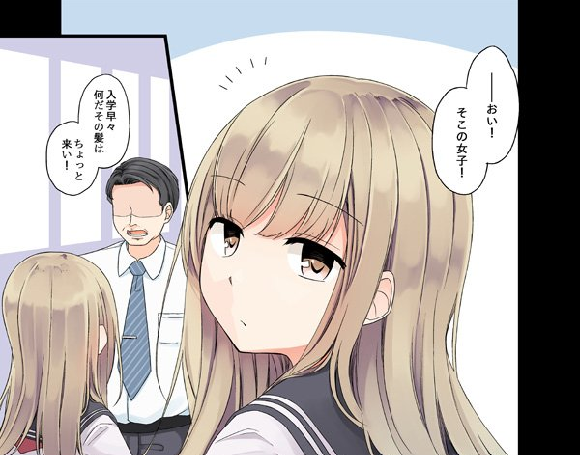
Even if no one’s a straight-up villain, life can still give you a chance to be a hero.
Recently, a long-simmering controversy boiled to the surface when an 18-year-old Osaka resident brought a lawsuit against the prefectural government over schools forcing her to dye her naturally brown hair black in order to conform with dress codes. While Japan is, in certain ways, a conformist society, the schools’ policies have been loudly condemned by some critics in Japan.
One such critic is Japanese Twitter user @niichi021, an illustrator and manga artist who publishes his work under the name Niichi. Inspired by the real-life plight of the woman, Niichi decided to pen a short manga about how difficult and painful it must be to face such pressure from educational authority figures, in which we see a series of brief yet important moments in the life of schoolgirl Yukari (translations below each page).
Teacher: “Hey, you, there, girl! The school year’s just started, and you’ve already dyed your hair? Come with me!”
Yukari: “…okay.”
Yukari (thinking): “This sort of thing has happened to me so many times, so now I’m just like ‘Ugh, again.’”
Teacher (looking at certificate of Yurika’s natural hair color): “Hmmm…”
Teacher: “…Is that really your natural hair?”
Yukari: “…It’s natural. Can you see how it comes out like this?”
Teacher: “That’s okay. I’m really sorry. It’s just that…how should we handle this… If we let you keep your hair like that, other students might use it as an excuse to dye their hair the same color, and then things will start to get out of hand. I mean, we’re a private school, and we’ve got a reputation to protect…you know? So…we’re not going to force you, but if you could dye your hair a more normal shade….”
Yukari: “Teacher…”
Yukari (thinking): “What is ‘normal?’”
Yukari: “…I understand.”
Girl: “‘morning, Yurika!”
Yukari: “Good morning.”
Girl: “…So did they say something to you about your hair?”
Yukari: “Yeah. I guess it really stands out.”
Yukari (thinking): “I understand.”
Yukari (thinking): “A lot of people spend their days together at school, so to maintain order it’s necessary to draw a line somewhere. Your hair has to be black. Your skirt has to come down to your knees, your collar has to be nice and straight. You have to pretend to be a ‘normal person.’”
Boy: “…Huh?”
Boy: “Your hair, it’s black!”
Yukari: “Do you know each other?”
Boy: “You know, you seemed a lot more cheerful at the start of the school year welcome ceremony. Did you dye your hair?”
Yukari: “Yeah, I did. Is that your natural color?”
Boy: “Huh…so you dyed it. That’s too bad.”
Yukari: “What do you mean, ‘too bad?’”
Boy: “You know what I mean. Your hair was really beautiful. It was really beautiful on the day of the ceremony. I was in the row behind you, and I watched your hair blowing in the breeze and shining in the sun.”
Boy: “The way it sparkled was so beautiful. I was jealous. No matter how much I dye my hair -”
Teacher: “Hey, you, there, boy!”
Boy: “Uh oh! Catch you later.”
Yukari: “Yeah.”
Teacher: “You there, no running in the halls!”
Yukari: “Hey…”
Deliveryman: “Ms. Tachibana? This is the last box. Where should I put it?”
Yukari: “Oh, thanks. Right over here, please.”
Yukari (thinking): “That ended up being the last time that boy and I ever talked to each other. We didn’t have any classes together for all three years we were at that school. We never had another conversation, so I don’t know where he is now or even his name. ’Beautiful.’ I bet he doesn’t even remember saying that to me. He probably doesn’t even remember the girl with the light-colored hair.”
Yukari (thinking): “But I haven’t forgotten. Every time I open the curtain in the morning, I remember.”
Yukari: “Okay, guess I’ll start by unpacking these boxes.”
Yukari (thinking): “Every time the sun shines through my bangs, I remember the words you said.”
At just eight pages long, Niichi’s touching story has an emotional complexity that belies its short length. While she doesn’t want to dye her hair, Yukari is empathetic enough to at least partially understand the school’s position, even while yearning for the teacher to have a better understanding that, in this case, “normal” is a relative concept that doesn’t directly apply to her in the same way it would to her classmates. And most powerfully of all, it shows that sometimes a simple kind gesture can have a huge effect on someone’s life, and that it’s important to take the opportunity to do so when a chance presents itself.
Source: Twitter/@niichi021 via Jin
Images: Twitter/@niichi021 (1, 2)
Follow Casey on Twitter, where he never really though about dying his hair because it changed color on its own twice while he was growing up.

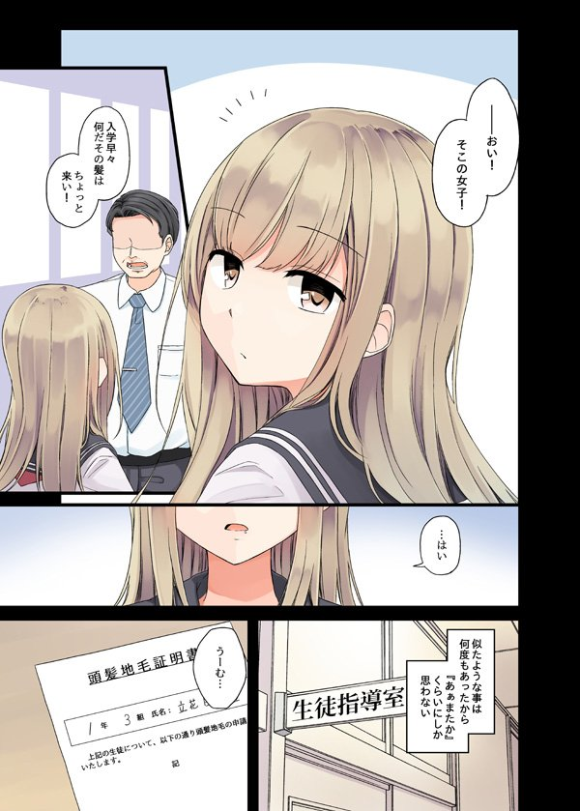


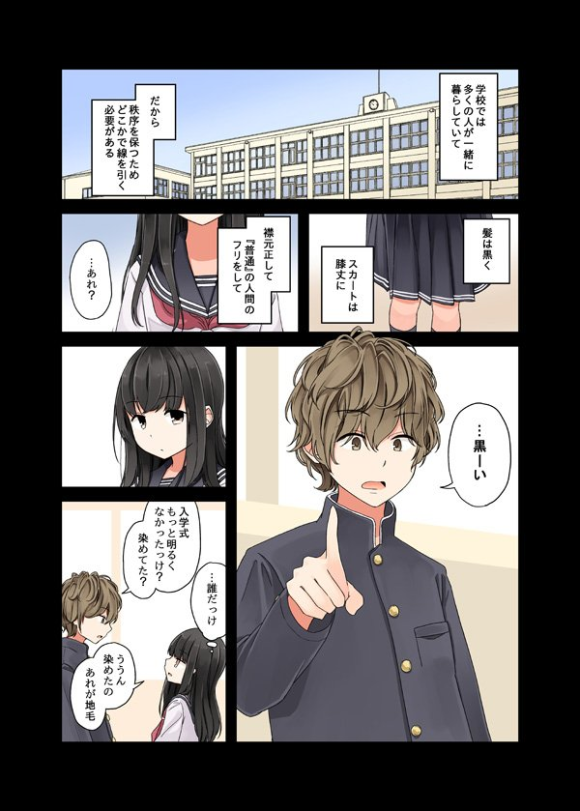
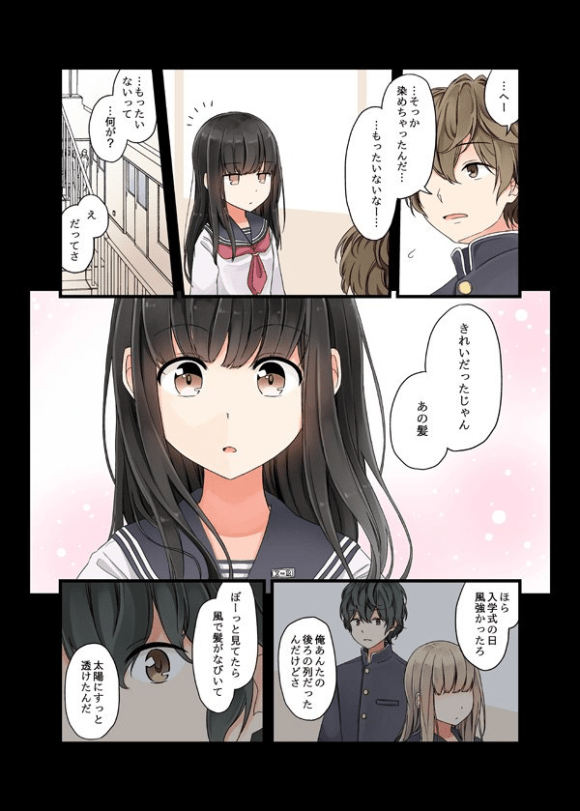
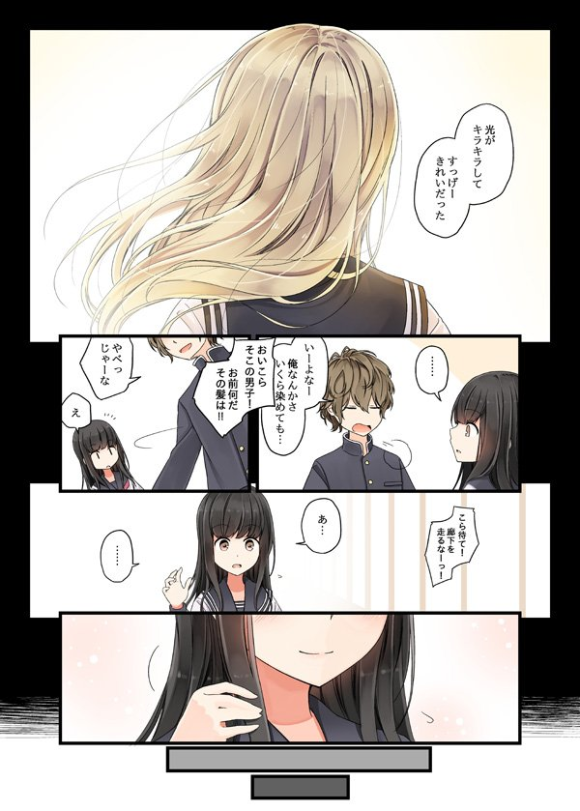
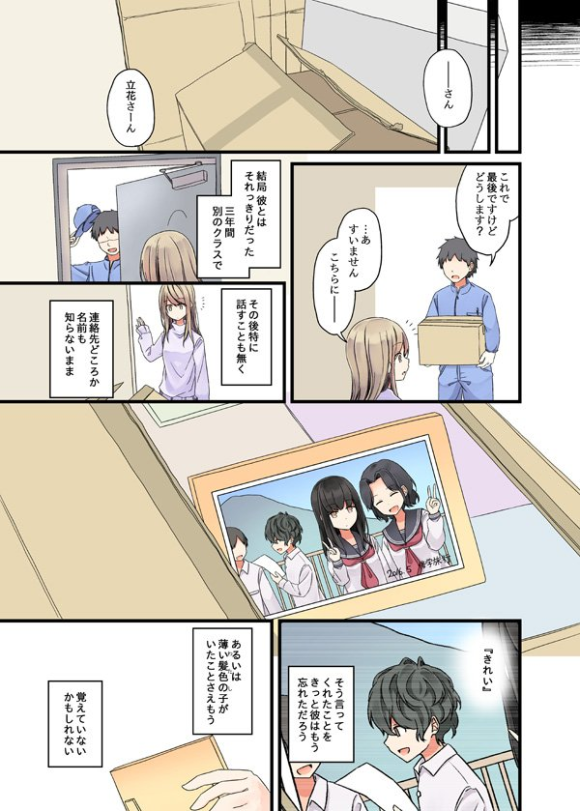
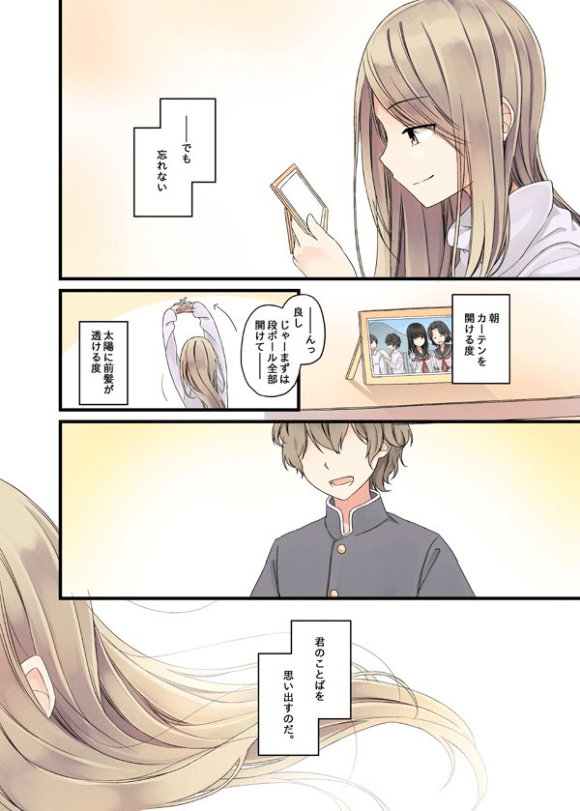
 All Tokyo public high schools abolish rules forcing students to dye non-black hair, underwear color regs
All Tokyo public high schools abolish rules forcing students to dye non-black hair, underwear color regs Naturally brown-haired Osaka student sues government for forcing her to dye her hair black
Naturally brown-haired Osaka student sues government for forcing her to dye her hair black Japanese high school teachers forcibly cut off hair that was “too long” from 44 students
Japanese high school teachers forcibly cut off hair that was “too long” from 44 students Tokyo public schools will stop forcing students with non-black hair to dye it, official promises
Tokyo public schools will stop forcing students with non-black hair to dye it, official promises Brown-haired girl sues Japanese school for telling her to dye hair black, court makes decision
Brown-haired girl sues Japanese school for telling her to dye hair black, court makes decision Starbucks Japan releases first-ever Hinamatsuri Girls’ Day Frappuccino
Starbucks Japan releases first-ever Hinamatsuri Girls’ Day Frappuccino Japanese drugstore sells onigiri at pre-stupid era prices, but how do they compare to 7-Eleven?
Japanese drugstore sells onigiri at pre-stupid era prices, but how do they compare to 7-Eleven? Japan Extreme Budget Travel! A trip from Tokyo to Izumo for just 30,000 yen [Part 1]
Japan Extreme Budget Travel! A trip from Tokyo to Izumo for just 30,000 yen [Part 1] Japan has only one airport named after a samurai, so let’s check out Kochi Ryoma【Photos】
Japan has only one airport named after a samurai, so let’s check out Kochi Ryoma【Photos】 A century of love – How dating and marriage have evolved in Japan
A century of love – How dating and marriage have evolved in Japan In Kyoto, “Hey, you’ve got a really nice watch” is NOT a compliment, Japanese businessman says
In Kyoto, “Hey, you’ve got a really nice watch” is NOT a compliment, Japanese businessman says Princess Mononoke gets first-ever IMAX screenings to show off gorgeous new remaster【Video】
Princess Mononoke gets first-ever IMAX screenings to show off gorgeous new remaster【Video】 You can now rent “fat people” in Japan
You can now rent “fat people” in Japan How to make curry in a rice cooker with zero prep work and no water[Recipe]
How to make curry in a rice cooker with zero prep work and no water[Recipe] Starbucks Japan unveils new Sakura Frappuccino for cherry blossom season 2025
Starbucks Japan unveils new Sakura Frappuccino for cherry blossom season 2025 The 10 most annoying things foreign tourists do on Japanese trains, according to locals
The 10 most annoying things foreign tourists do on Japanese trains, according to locals Highest Starbucks in Japan set to open this spring in the Tokyo sky
Highest Starbucks in Japan set to open this spring in the Tokyo sky Tokyo Skytree turns pink for the cherry blossom season
Tokyo Skytree turns pink for the cherry blossom season Starbucks Japan releases new sakura goods and drinkware for cherry blossom season 2026
Starbucks Japan releases new sakura goods and drinkware for cherry blossom season 2026 Japan’s new “Cunte” contact lenses aren’t pronounced like you’re probably thinking they are
Japan’s new “Cunte” contact lenses aren’t pronounced like you’re probably thinking they are Shibuya Station’s Hachiko Gate and Yamanote Line stairway locations change next month
Shibuya Station’s Hachiko Gate and Yamanote Line stairway locations change next month Yakuzen ramen restaurant in Tokyo is very different to a yakuza ramen restaurant
Yakuzen ramen restaurant in Tokyo is very different to a yakuza ramen restaurant Starbucks Japan adds new sakura Frappuccino and cherry blossom drinks to the menu
Starbucks Japan adds new sakura Frappuccino and cherry blossom drinks to the menu Japan just had its first same-month foreign tourist decrease in four years
Japan just had its first same-month foreign tourist decrease in four years Burning through cash just to throw things away tops list of headaches when moving house in Japan
Burning through cash just to throw things away tops list of headaches when moving house in Japan Japan’s newest Shinkansen has no seats…or passengers [Video]
Japan’s newest Shinkansen has no seats…or passengers [Video] Foreigners accounting for over 80 percent of off-course skiers needing rescue in Japan’s Hokkaido
Foreigners accounting for over 80 percent of off-course skiers needing rescue in Japan’s Hokkaido Super-salty pizza sends six kids to the hospital in Japan, linguistics blamed
Super-salty pizza sends six kids to the hospital in Japan, linguistics blamed Starbucks Japan unveils new sakura Frappuccino for cherry blossom season 2026
Starbucks Japan unveils new sakura Frappuccino for cherry blossom season 2026 Foreign tourists in Japan will get free Shinkansen tickets to promote regional tourism
Foreign tourists in Japan will get free Shinkansen tickets to promote regional tourism Take a trip to Japan’s Dododo Land, the most irritating place on Earth
Take a trip to Japan’s Dododo Land, the most irritating place on Earth Naruto and Converse team up for new line of shinobi sneakers[Photos]
Naruto and Converse team up for new line of shinobi sneakers[Photos] Is China’s don’t-go-to-Japan warning affecting the lines at a popular Tokyo gyukatsu restaurant?
Is China’s don’t-go-to-Japan warning affecting the lines at a popular Tokyo gyukatsu restaurant? Survey asks foreign tourists what bothered them in Japan, more than half gave same answer
Survey asks foreign tourists what bothered them in Japan, more than half gave same answer Japan’s human washing machines will go on sale to general public, demos to be held in Tokyo
Japan’s human washing machines will go on sale to general public, demos to be held in Tokyo Starbucks Japan releases new drinkware and goods for Valentine’s Day
Starbucks Japan releases new drinkware and goods for Valentine’s Day We deeply regret going into this tunnel on our walk in the mountains of Japan
We deeply regret going into this tunnel on our walk in the mountains of Japan Studio Ghibli releases Kodama forest spirits from Princess Mononoke to light up your home
Studio Ghibli releases Kodama forest spirits from Princess Mononoke to light up your home Major Japanese hotel chain says reservations via overseas booking sites may not be valid
Major Japanese hotel chain says reservations via overseas booking sites may not be valid Put sesame oil in your coffee? Japanese maker says it’s the best way to start your day【Taste test】
Put sesame oil in your coffee? Japanese maker says it’s the best way to start your day【Taste test】 No more using real katana for tourism activities, Japan’s National Police Agency says
No more using real katana for tourism activities, Japan’s National Police Agency says Former AKB48 member speaks out against Osaka school that forced its student to dye her hair
Former AKB48 member speaks out against Osaka school that forced its student to dye her hair Students confused over Japanese school banning ponytails for “conjuring lustful feelings”
Students confused over Japanese school banning ponytails for “conjuring lustful feelings” “Students are only allowed three sneezes in class” Japanese people share their worst school rules
“Students are only allowed three sneezes in class” Japanese people share their worst school rules Japanese high schools abolish old rules, provide freedom with underwear, hair and dating
Japanese high schools abolish old rules, provide freedom with underwear, hair and dating Elementary and junior high students speak out on Japan’s strangest school rules
Elementary and junior high students speak out on Japan’s strangest school rules Japanese school renames boys, girls uniforms as “Type I” and “Type II” in gender identity reform
Japanese school renames boys, girls uniforms as “Type I” and “Type II” in gender identity reform Majority of Nagasaki high schools and middle schools have white-underwear-only rules, study finds
Majority of Nagasaki high schools and middle schools have white-underwear-only rules, study finds Student in Japan misses week of class after school won’t let him wear sweatshirt on snowy day
Student in Japan misses week of class after school won’t let him wear sweatshirt on snowy day Japanese high school teacher in hot water after forcibly giving male student a buzz cut
Japanese high school teacher in hot water after forcibly giving male student a buzz cut Line up in the hall, open your shirts, show your bras – Real instructions from one Japanese school
Line up in the hall, open your shirts, show your bras – Real instructions from one Japanese school Manga artist wants Japanese teachers to feel, for two seconds, how dumb their girls’ dress code is
Manga artist wants Japanese teachers to feel, for two seconds, how dumb their girls’ dress code is Head of Tokyo board of education gets asked about dumb school hairstyle rule, gives dumb answer
Head of Tokyo board of education gets asked about dumb school hairstyle rule, gives dumb answer “Which hairstyle makes a woman look good at her job?” asks Japanese survey
“Which hairstyle makes a woman look good at her job?” asks Japanese survey Teacher hides touching message to departing students in final test
Teacher hides touching message to departing students in final test Do Japanese kids need to wear special slippers at school? One part of Tokyo doesn’t think so
Do Japanese kids need to wear special slippers at school? One part of Tokyo doesn’t think so Are virtual reality schools the future of education in Japan?
Are virtual reality schools the future of education in Japan?